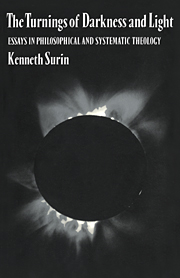Book contents
- Frontmatter
- Contents
- Dedication
- Preface
- Abbreviations
- 1 Creation, revelation and the analogy theory
- 2 The Trinity and philosophical reflection: a study of David Brown's The Divine Trinity
- 3 ‘Is it true what they say about “theological realism”?’
- 4 The impassibility of God and the problem of evil
- 5 Theodicy?
- 6 Tragedy and the soul's conquest of evil
- 7 Atonement and moral apocalypticism: William Styron's Sophie's Choice
- 8 Atonement and christology
- 9 Revelation, salvation, the uniqueness of Christ and other religions
- 10 ‘Many religions and the one true faith’: an examination of Lindbeck's chapter 3
- 11 Contemptus mundi and the disenchanted world: Bonhoeffer's ‘discipline of the secret’ and Adorno's ‘strategy of hibernation’
- 12 ‘The weight of weakness’: intratextuality and discipleship
- 13 ‘Theistic arguments’ and ‘rational theism’
- Notes
- Index of names
- Index of subjects
2 - The Trinity and philosophical reflection: a study of David Brown's The Divine Trinity
Published online by Cambridge University Press: 19 January 2010
- Frontmatter
- Contents
- Dedication
- Preface
- Abbreviations
- 1 Creation, revelation and the analogy theory
- 2 The Trinity and philosophical reflection: a study of David Brown's The Divine Trinity
- 3 ‘Is it true what they say about “theological realism”?’
- 4 The impassibility of God and the problem of evil
- 5 Theodicy?
- 6 Tragedy and the soul's conquest of evil
- 7 Atonement and moral apocalypticism: William Styron's Sophie's Choice
- 8 Atonement and christology
- 9 Revelation, salvation, the uniqueness of Christ and other religions
- 10 ‘Many religions and the one true faith’: an examination of Lindbeck's chapter 3
- 11 Contemptus mundi and the disenchanted world: Bonhoeffer's ‘discipline of the secret’ and Adorno's ‘strategy of hibernation’
- 12 ‘The weight of weakness’: intratextuality and discipleship
- 13 ‘Theistic arguments’ and ‘rational theism’
- Notes
- Index of names
- Index of subjects
Summary
‘Proving God's existence’
The first part of David Brown's The Divine Trinity is devoted to a vigorous apologetic undertaken on behalf of a God who ‘intervenes’. Brown is convinced that, given the appropriate ‘interventionist’ assumptions, ‘religious experience’ can provide genuine knowledge about the existence and character of God. This conviction prompts Brown to formulate an alleged ‘proof’ of God's existence, which is worth reproducing in full, since it provides an accurate insight not only into Brown's understanding of ‘religious experience’, but also places into sharper focus the epistemology which lies at the heart of his argument in this book:
(1) Religious experience is a distinct type of experience.
(2) Whenever a type of experience occurs with which one is not personally acquainted, then the only rational course is to accept claims made on the basis of this experience, unless sufficient grounds can be adduced for doubting the coherence or intelligibility of such claims.
(3) Therefore, if cognitive claims are made on the basis of religious experience, the only rational course is to accept these claims – with the same proviso.
(4) But all those who have these experiences sincerely claim that they give knowledge of the divine.
(5) Therefore, the only rational course is to accept the existence of the divine – again, with the same proviso.
(6) But the proviso in (2) is met – there are no such sufficient grounds.
(7) Therfore, the divine exists. (p.35)
- Type
- Chapter
- Information
- The Turnings of Darkness and LightEssays in Philosophical and Systematic Theology, pp. 20 - 40Publisher: Cambridge University PressPrint publication year: 1989



